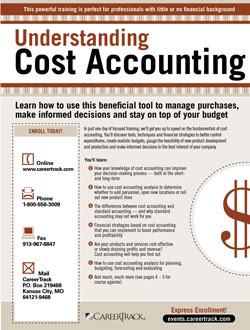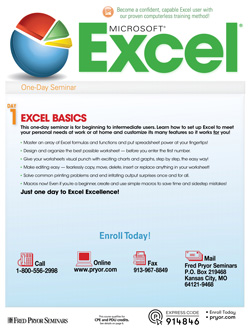Learn how to use this beneficial tool to manage purchases, make informed decisions and stay on top of your budget
Cost Accounting — a fresh approach for controlling costs, monitoring performance and increasing profitability
As organizations continue to tighten their belts and monitor every dollar spent, financial analysis becomes a critical part of management and team operations. By using cost accounting — a method of evaluating projected profits and weighing them against projected costs — managers are better able to account for expenditures, create a budget based on relevant financial data, identify production costs and pinpoint waste, adjust marketing strategies and make better business decisions.
A critical skill for all managers, regardless of financial background
As a manager, you're expected to squeeze more performance from far fewer resources, deal with budget cuts and downsizing and continue to make the smart business decisions that will promote the growth and health of your organization. While you don't need to be a financial expert (leave that to the folks over in Finance and Accounting), you do need a solid grasp of finance as it relates to your department, your staff and your operations.
This workshop was created to give you an introduction to the fundamentals of cost accounting. Cost accounting involves evaluating the costs of materials, labor and expenses, and then estimating predicted profits. By relying on standard accounting practices (involving assets and liabilities), you may be unintentionally short-changing yourself and your organization. Cost accounting is a simpler, more department-focused way of analyzing costs and can be applied to almost any business. The concepts are simple to understand and implement, and offer a much more accurate picture of the real costs involved in conducting day-to-day operations and keeping your business in the black.
Cost accounting will help you:
- Determine whether it's cost-effective to launch new products, scale back or revise product lines
- Avoid making unnecessary purchases that aren't in your company's best interest
- Track trends that may adversely affect production costs
- Accurately measure how department and company resources are being utilized
- Create budgets and cost control programs that reflect the "real numbers"
Mastering the financial skills and strategies in Understanding Cost Accounting will put you on par with today's most effective leaders — people who are instrumental in affecting the way their departments, divisions and organizations do business. From new product development to staffing decisions, and department expenditures to allocation of marketing resources, cost accounting can be extremely helpful in coming up with the sound financial decisions that will positively impact your bottom line.

Learn how to use this beneficial tool to manage purchases, make informed decisions and stay on top of your budget
In just one day of focused training, you'll discover tools, techniques and financial strategies to better control expenditures, create realistic budgets, gauge the feasibility of new product development and production and make informed decisions in the best interest of your company.
Download BrochureWhat is Cost Accounting?
- Understand the concept of cost accounting from a manager's perspective
- Standard accounting versus cost accounting — three critical differences you need to know
- Why standard accounting may not produce the information required to analyze and predict business performance
- How cost accounting will help your decision-making process and help to focus on growth, profits and opportunities
- You compare: interpret income statement data from a standard accounting perspective and a cost accounting perspective
Two Major Streams for Cost Accounting
- Process-based costing — what it is and how to apply this model to your business
- Project or job costing — gathering the data you need to put the numbers into practice
- Why these two systems can apply to almost any business model and businesses of any size
- Examples of how separating cost and revenue can provide insight into business performance
Fixed, Variable and Overhead Costs
- The differences between fixed, variable and overhead costs — how these differences can affect analysis
- Three characteristics of fixed costs, overhead costs and variable costs
- How their interrelationship affects profitability
- How to use these costs to gather information and plan for the future
- Addressing variances: how to account for differences between actual costs and expected results
- How cost accounting helps management react to problems and opportunities as they occur in the real world
Cost and Volume Relationships
- The connection between costs, volume and profitability
- How to predict profitability by examining the relationship between revenue, cost of sale, overhead and volume
- How cost and revenue can be used to examine "what if" scenarios with differing volumes
- How analyzing cost/volume relationships can be used to predict break-even minimums, evaluate new and existing product lines and indicate whether volumes are achievable
- How cost/volume information can be used to determine when it's prudent to launch new products or make changes to existing product lines
Budgets and Flexible Budgets
- How to use cost data to create a more accurate budget
- The "flexible budget" — what it is, how it differs from a traditional budget and why it's one of the most powerful tools in your accounting toolbox
- How flexible budgets tie the actions of different departments together
- Sales, operations, and administration — how a flexible budget separates these results for more accurate analysis and departmental management
- How flexible budgets adjust for actual results and offer a unique outlook on achieving and exceeding goals
Implementing Cost Accounting
- Overcome resistance to change — strategies to get buy-in on every level, from staff to management
- How to prove cost accounting's value and benefits to your business
- Get the accounting department on board — how to convince them the extra work involved with producing cost accounting data is worth the effort
- How to work through the challenges involved in implementing a cost accounting system within your organization


